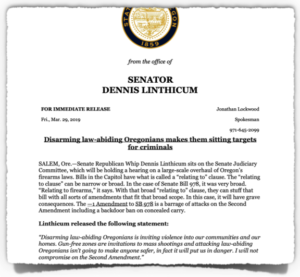Oregon State Legislature sent this bulletin Wednesday, April 26, 2017 by devadmin
Hello Friends,
Last week, the co-chairs of the Joint Ways and Means Committee released their budget framework. Their budget claims to address the reality that, “we must grapple with the fact that Oregon is facing a $1.8 billion budget shortfall in the coming biennium.” But, it falls short of a successful take-down and there really is no serious grappling going on here.
Grappling would involve something more real, sweaty and contentious. It would be a battle where serious issues were actually addressed. “Grapple” is a high-energy, action word where one would expect to see significant headway when it comes to dealing with Oregon’s currently unsustainable trajectory.
It appears that the co-chairs don’t realize that Oregon has been in a tepid and barely measurable economic recovery. Our economy is one of the weakest in history in terms of job growth, although revenue is flowing into the state’s coffers. If we fall into another recession, the PERS unfunded liabilities will necessarily sky-rocket leaving Oregon with no tools or dry powder left.
At least the co-chairs have come to realize that Governor Brown’s budget has problems. Yet, they insist on classifying the problem as being a $1.8B shortfall.
This is not true. There is no shortfall.
Even with our tepid economic growth there is more revenue pouring into Oregon’s treasury than ever before. Never in Oregon’s history has so much money been available for government services. The truth is our current biennium is expected to gain $3.1B more revenue than the previous biennium largely due to rising marginal tax rates and the economically destructive bracket creep across all income levels.
Our real problem is that government growth has outpaced revenue growth by the $1.8B shortfall. Clearly, this calls for a different mind-set when it comes to wrestling with Oregon’s sustainability.
Oregon’s problem is a spending problem.
Not only are we spending more than we receive from local taxpayers but nearly forty-cents ($.40) of every dollar ($1.00) spent by Oregon comes directly from federal funding sources. This means that 4 out of every 10 teachers is funded by the federal government. It also means, 4 out of every 10 state troopers, DEQ staff persons, university employees, parks & recreation staff, road department personnel, DHS staff, DAS personnel and more, is funded by federal dollars.
Now, in discussion, you might be told, this is not true because federal monies are typically silo-ed into specific areas like infrastructure, highways, criminal justice, prison systems and grants for employees, research projects and studies.
However, this masks what is going on. You see, if Oregon can save a dollar on infrastructure by using Uncle Sam’s dollar instead, then the dollar saved by Oregon can get shifted toward other services or personnel. Hence nearly 40% of Oregon’s entire budget, meaning all services, projects and expenditures comes from federal funding. This is clearly unsustainable.
Why?
The answer is it all comes from the same place – the taxpayer’s pocket

Governments, just like people, come into the world naked and poor. People either inherit resources or create money through hard work. In the private sector we see this occurring through competition, innovation, and invention. For government, the citizens with their ingenuity and wealth creation are the only source at hand.
What we are witnessing today, in the public sphere, is a cavalier attitude toward this ultimate source of wealth. The co-chairs budget statement even attempts to shift blame onto the backs of citizens for daring to prefer a smaller government that might actually live within it’s means.
The co-chairs belittle Oregon’s citizens for adopting Measure 5, by voter approval in 1990. Measure 5 reduced property taxes while shifting the responsibility for funding K-12 schools from local property taxes to the state general fund. This was a perfectly legitimate request from the citizens regarding how their money was to be allocated and spent. Voters also passed Measure 50 which limited funding on local tax levies.
Besides unfunded PERS liabilities at $22 Billion, our Oregon debt load is $37.5 Billion, or about $9,300 for every man, women and child in the state. Unfortunately newborns and five-year-olds aren’t paying any taxes so someone else is on the hook for their share.
Now, while I’ve got you thinking about debt, add-in your city’s debt and unfunded liabilities, your county’s debt and unfunded liabilities, your mortgage, your credit card, auto and student loan debt and then top it off with your share of the federal debt ($20 Trillion) or, ~$61,000 per person.
There is only one way out. Prudence and wisdom dictate that we cannot continue to spend like debt is an economic elixir.
Voters passed Measure 5 and 50; they rejected Measure 97; their wishes need to be heard and respected. We must learn to be frugal – it’s our only hope.
Remember, if we don’t stand for rural Oregon values and common-sense
– No one will!
Best regards,

Dennis Linthicum
Oregon State Senate 28

























